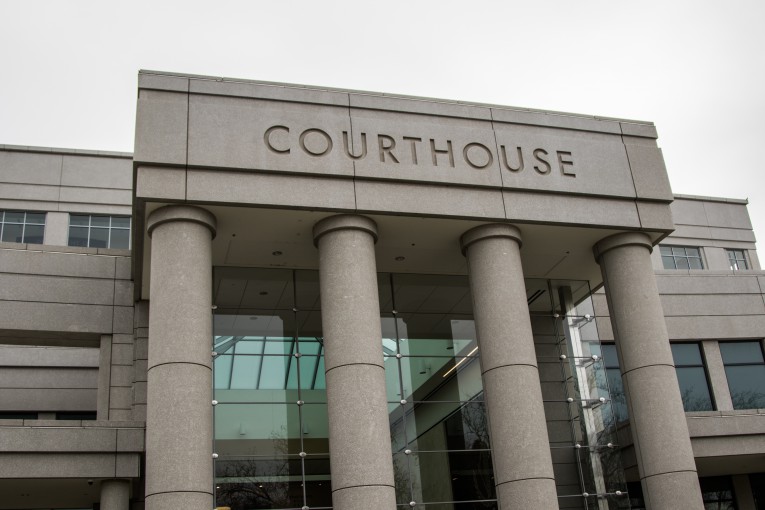
 By Tiffany Yeh
By Tiffany Yeh
Darnell Dorsey is accused of assaulting a child, causing the child’s death in Davis.
The prosecution’s medical expert in the case is Dr. Bennet Omalu, who is a UC Davis Medical Center pathologist and San Joaquin County medical examiner.
The defense’s medical expert wants all of the stock jars of the child’s organs. Deputy Public Defender Joseph Gocke asked for wet tissue blocks (wet tissue from the autopsy, preserved in paraffin blocks), from the prosecution by email.
Judge Paul Richardson asked the defense to show why they needed additional cuttings, as requested by email, when the prosecution is providing cuttings that Dr. Omalu (their expert) made.
Deputy District Attorney Michelle Serafin argued that the prosecution is already complying with the defense’s discovery request of cuttings from the deceased child.
Judge David Reed had previously granted the discovery request.
Deputy Public Defender Martha Sequeira argued that where the cuttings are made (how the cuttings are cut) and which sections are examined makes a difference. How the tissue samples are stained and proteins used can differ by medical expert.
Judge Richardson at one point asked DPD Sequeira why the defense did not fly their expert (from a state on the East Coast) here to do the cuttings. She replied that it was the cost of doing so and that using biohazard containers from FedEx is less costly. The judge seemed amiable to the defense’s proposed idea of shipping the wet tissue block parts to the expert, instead of having her come to California.
The judge proposed that the medical experts call each other regarding which samples of the organs were needed and possibly coordinate something.
Interestingly, Ms. Sequeira mentioned that their defense medical expert and Dr. Bennet Omalu “don’t like each other quite fiercely” and that their medical expert had expressed concern that Dr. Omalu would be more antagonistic in his examination/testimony than if someone else were the defense medical expert.
Ms. Serafin suggested that a letter between the doctors, with what samples requested and why from the defense expert to their expert, would probably work.
Serafin also expressed concern about the apples to oranges comparison if the cuttings were from different areas of the same organ (done for all organs) of the child, and about being wary of letting the organ samples leave the prosecution’s care. Judge Richardson stated that it’s the jury’s call and that Dr. Omalu can retest the parts that he wants.
Ms. Sequeira agreed with the prosecution’s and judge’s sentiment of not wanting the defense to use all the samples, stating that some percentage would be left for the prosecution for their examination.
Ms. Serafin expressed wanting to know how much the defense needs, and requesting they be as specific as possible about which parts of the wet tissue blocks are requested. Sequeira did not have a copy of the discovery order present at this hearing.
Judge Richardson requested to know how much wet tissue block is requested and more details, and expressed his wish to keep the trial on its current schedule. This matter will be further discussed on May 6 at 8:30 a.m. in the same courtroom.
For me, this case brings up a major flaw of our adversarial system, namely the unequal access of the prosecution and the defense to evidence.
In this case, it would appear that the judge is doing his best to ensure adequate access to both sides in a situation where there can be significant cost and delay in a full and fair interpretation of the evidence. My concern is that we have seen cases in which judges clearly favored one side over the other ( the Dev case comes most readily to mind) or became too impatient to allow time for full evaluation and presentation by both sides. I believe that full and equal access to evidence must be available to both sides in order to ensure a fair representation of the facts and that we frequently fall short of that standard.
Agreed, Tia. And one has to look no further than the county budget, to see the problem — an almost 3x inequality, even if one takes ‘victim services’ out of the mix:
District Attorney:
171 Criminal Prosecution 205-1 174 $11,272,085
Consumer Fraud & Enviro Protection 205-2 175 $1,613,778
Special Investigation (YONET) 205-3 176 $115,000
Victim Services 205-4 177 $582,931
Child Abduction 205-5 178 $546,796
Multi-Disciplinary Interview Center 205-7 179 $313,442
Criminal Prosecution Special Programs 205-8 180 $2,621,695
Insurance Fraud Grants 205-9 181 $566,929
TOTAL: $17,632,656
Public Defender 210-1 193 $6,581,655
TOTAL: $6,581,655
http://www.yolocounty.org/home/showdocument?id=30674
Ann Block
Thank you so much for breaking this down for me. I had no idea that the discrepancy would be this large. Do you happen to have access or could you tell me how to efficiently get the breakdown by personnel and job description as it seems to me that staffing costs are probably a major factor ?
Tia, It is possible that information is available as well on the Yolo County website — you would have to search for it and see. It is a much larger discrepancy than some counties — say San Francisco for example, that I happened also to look at. Would be interesting what the difference is in Solano and Sacramento counties. Certainly, our Board of Supervisors should do a better job fairly allocating resources between prosecution and defense, especially if they are truly committed to equal justice.
Ann